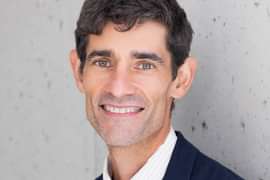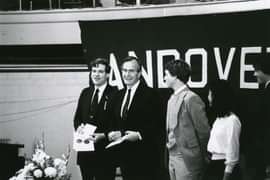September 24, 2015
Creating an equitable community
A Q&A with Linda Carter Griffith, assistant head of school for equity and inclusionby Phillips Academy
Linda Carter Griffith became Andover’s first assistant head of school for equity and inclusion on July 1. The former dean of CAMD and member of the Andover community for more than 25 years has served, among other roles, as an English instructor, house counselor, cluster dean, and girls’ basketball coach. In the spring issue of Andover magazine, then-editor Kristin Bair O’Keeffe sat down with Griffith to discuss how her new role will help fulfill the goals set forth in Connecting Our Strengths: The Andover Endeavor, the Academy’s strategic plan.
What exactly do equity and inclusion mean?
In essence, equity means being invited to the table. Inclusion means helping to plan the menu. These are powerful words, and I want to make sure that people recognize that they are not code words for race. When we use these words, we mean everything and everyone, regardless of gender, sexual orientation, race, ethnicity, ability, geographic origin, class, or religion.
Why are they included as one of the three pillars of PA’s Strategic Plan?
During the strategic planning inquiry process, it became very obvious that the work done by the Access to Success committee—created a few years after PA initiated need-blind admission—had only begun to scratch the surface of our community’s awareness of the needs pertaining to issues of diversity, equity, and inclusion.
Why was Access to Success created and what was the outcome of the committee’s work?
At first, there was a sense on campus that it was enough to open the gates [via need-blind admission]. We said, “OK, the students have arrived. In many cases, we’re granting full tuition and expenses and now are bringing a parent or guardian to campus for Family Weekend.” We even created additional summer programs and travel opportunities.
But when the scholarship students arrived, we realized that even though they had the intellect, drive, energy, and aspiration that all our students have, many were coming from schools and neighborhoods that hadn’t been able to provide the necessary academic preparation plus cultural and social capital needed to succeed here. We realized that financial resources were not enough to help some of our students fully access Andover’s educational program. We needed to consider ways to enrich their academic preparation, as well as provide cultural and social capital. That’s why Access to Success was formed.
English instructor David Fox and I chaired the committee, and together with committed colleagues from many different departments, we initiated a number of positive changes for our scholarship students. Overall, we became more thoughtful in our approach to supporting all students. We implemented mandatory study halls, consistent bilingual communication with parents, earlier advisor reports on juniors, pre-junior summer for students who need a longer runway for takeoff, and more. In fact, our academic review system has changed considerably, and each student has a team of adults that meets whenever a concern arises.
Diversity encompasses all the differences that make us unique, including but not limited to race, color, ethnicity, language, nationality, sexual orientation, religion, gender, and socioeconomics. Equity denotes an environment in which each individual member of a diverse community feels valued and is able to fully develop their working potential and contribute to the organization’s success. We have a diverse community here at PA; we don’t yet have a community that is entirely equitable and in which everyone feels included. We’re working on it, and we’ve gotten better and better. But we’re not there yet.
Your new role as assistant head of school for equity and inclusion is an exciting and important one, but this is tough stuff. How did your new role come about?
In September 2014, Head of School John Palfrey, Trustee Gary Lee ’74, and I spent three days in Washington, D.C., at a diversity symposium with other independent school administrators from around the nation. We went as a team because Gary and John also understand that this work only gets done when the top sees it, gets it, and wants it to happen. Truly, none of this would be possible if John Palfrey hadn’t said, “This is important for everybody. Everybody.”
At the symposium, we were asked to strategize and develop a solid and realistic set of goals related to diversity, equity, and inclusion for our school. We left with clear strategic goals about what we needed to do to level the playing field and enhance our commitment to all school constituencies.
Today I find myself in a position with a high level of support to meet our goals of equity and inclusion. And I need to work with all of our constituencies in order to be successful in reaching our shared goals. I am helping administrators, faculty, trustees, and staff reflect and ask if each area of our school—curriculum, athletics, theatre—is an inclusive, welcoming environment.
How has multicultural work evolved over the years?
Originally our focus was on the marginalized, the minority. Affirming and providing opportunities for access to those students. The work has evolved as our community has increasingly become more diverse. Last year, for example, we received applications from students in 96 different countries. Ninety-six countries! No longer can the conversation be only about the marginalized or the minority; it also must be about the majority and the privileged in our community. We must maintain a global lens. When you’re in an institution that cares about excellence, you’re always asking, “What’s next?” Here we are again, asking, “What’s next?”
The term “microaggression” is heard often on campus. What does it mean?
Microaggressions are subtle words, cues, or behaviors that insult, invalidate, or exclude traditionally marginalized group members. I like the term because it emphasizes the fact that these are not intentional. They’re micro, and they happen because of unconscious biases we all have.
How about “unconscious bias”?
This refers to our unconscious attitudes or stereotypes that affect how we treat people. These biases are formed by how we’re socialized, our experiences in various communities, and our exposure—or lack of exposure—to views different from our own. Unconscious bias affects how we interact with people, as well as what we say and what we don’t say. It even affects whom we might decide to talk to—or not.
Over the past several months, the Andover community has been working on the Assessment of Inclusivity and Multiculturalism (AIM) survey. What is it and how will it inform the steps we take from here?
The AIM survey is a tool used by independent schools to assess the overall climate of an institution as it relates to inclusivity. It was the first step of a two-part comprehensive evaluation of campus climate, and it’s significant because while we had many anecdotal stories of microaggressions, inequities, injustices, and incidents that involve a lack of cultural competency, we didn’t have quantitative data. In spring 2014, we initiated the survey.
The second step was to conduct focus groups with alumni, trustees, students, staff, and others. A full report on the results is now underway. The combination of the quantitative and qualitative will allow us to be more precise and more strategic in how we move forward in our goals of equity and inclusivity.
I’ve often heard you refer to the “head/heart/hand.” Can you explain what that means?
One of the challenges in a school that strongly values academic excellence is that people often focus on the scholarship. They might even focus on the data exclusively and think that’s enough to create an engaging, inclusive climate. But it’s not. You also need the stories from the hearts of our experiences and actions to make change. This is why I love the AIM survey. Not only does it support PA’s founding ideal of “goodness and knowledge,” but it also encompasses the head, heart, and hand. The quantitative data is the head. The qualitative is the heart—the stories people share about life on this campus, living in this community, working in this community. Then you have the hand, which is action—we’re taking action as a school through the Strategic Plan.
What are your priorities in your new role?
One of the first is microaggressions. Not just awareness of microaggressions, but figuring out how to stop them. I’m convinced we do this by educating about unconscious bias and training in how to have courageous conversations about difference.
Social media plays a big part in this because it creates more challenges in understanding difference. Facebook influences our young folks and their views on race, gender, religion, and more. Instagram, Snapchat, Twitter, and other social media sites are forcing us to think about how we’re educating young people, as well as faculty and staff. No longer can we assume our kids are protected from external factors. The “Andover bubble” has been burst.
Equally important is the hiring and retaining of more faculty of color. We need to take a specific look at underrepresented males of color. That’s still our smallest demographic.
We also need to embed race, class, gender, and sexual orientation into the curriculum. A faculty implementation committee is currently focused on developing a more inclusive curriculum, and AIM results will inform our next steps more specifically.
What is your vision for PA?
LCG When I began working as dean of CAMD, I was very focused on mentorship and access for those who come to us from underserved communities and schools. I wanted those students to thrive—not just survive—at Andover. Now I will place my attention on moving a school that values diversity and multiculturalism to a school that breathes equity and inclusion into every initiative and endeavor. A school that asks, “Do we have everyone’s input and everyone’s best interest at heart?”
Recently I attended a workshop at which a woman was speaking of Dr. Martin Luther King Jr.’s dream. She said she hadn’t truly understood that Dr. King wasn’t just talking about a dream. When she began to study his vision, she learned he also had a plan.
I have been given the privilege of being in a position to now enact a plan, a plan that places Phillips Academy at the front and center in creating a climate that deserves the platinum star for equity and inclusion.
On LCG’s bookshelf:
Whistling Vivaldi: How Stereotypes Affect Us and What We Can Do by Claude M. Steele Waking Up White and Finding Myself in the Story of Race by Debby Irving Microaggressions in Everyday Life: Race, Gender, and Sexual Orientation by Derald Wing Sue Blind Spot: Hidden Biases of Good People by Mahzarin R. Banaji and Anthony G. Greenwald
Categories: Academics
Other Stories

Spring 2024 issue will explore how Andover is shaping the future




